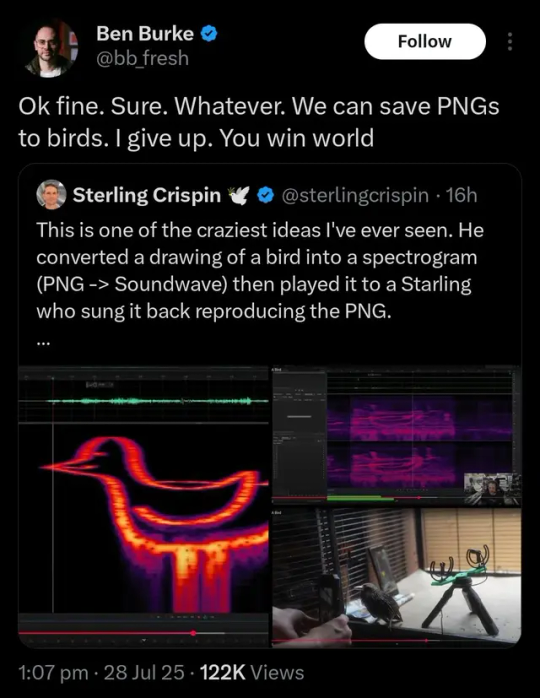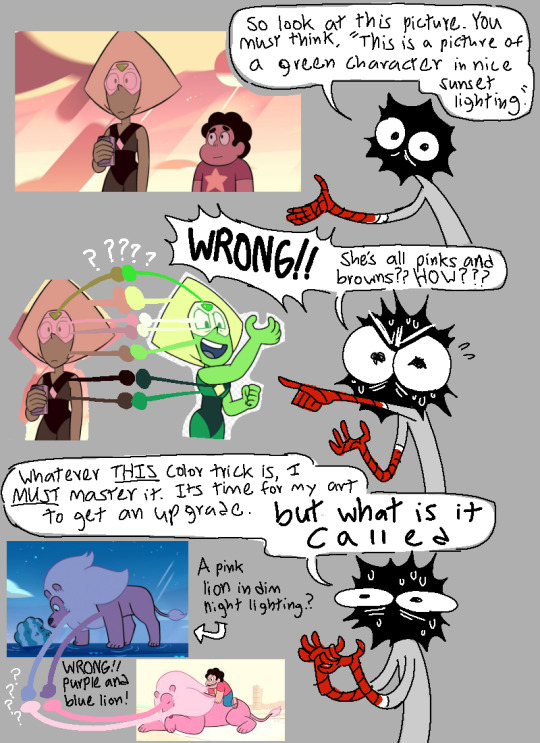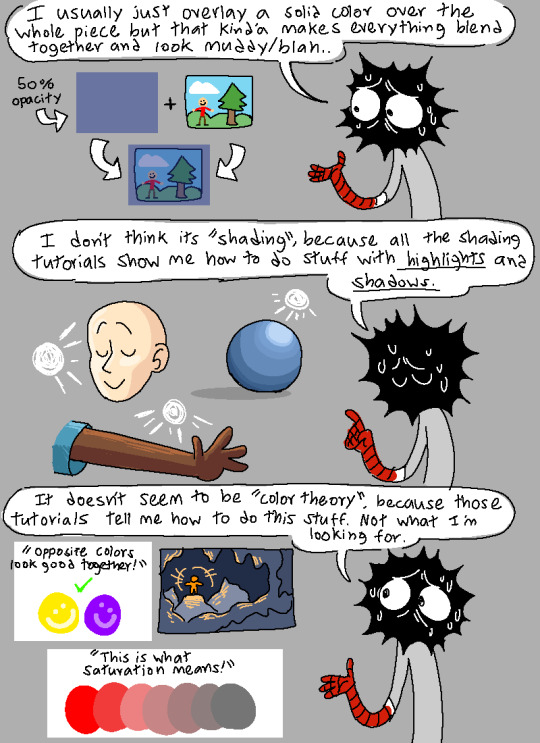Text
i think it's fucked up that there are plants that decided they wanted to eat meat
239K notes
·
View notes
Text
Sometimes, Bug gets fixated on trying to peck at scabs on my arms (these ones from teeny tiny baby peafowl claws as they climb all over me... there's a REASON I wear hoodies year round normally, it is ARMOR against modern day goddamn velociraptors), and there's no real good way to stop her, she can be lightly fended off by physically blocking her but.

she will literally just push and contort herself to PLEASE LET HER HELP ME REMOVE THESE PARASITES??? why am I stopping her from helping me??? I have a few videos from today set to the background ambiance of her biting me biting me biting me biting me biti-
And so sometimes i lightly and momentarily close my fingers to draw her attention to the fact that she is being a pill. To be clear, I am NOT squeezing and she's not pulling- you can see there's no bunched skin or anything, she can pull away. This is the equivalent of holding/lightly squishing a cat's cheeks. I'm just being slightly annoying back to her to break her laser focus on making me bleed. In fact the above photo was taken after this one below, when she came right back to keep trying to "help" me by parasite picking my scratches...
But. it does look so dramatic.

girl... give it a break. let me heal from the wounds of your children. I'm trying to play merge dragons and you're politely cannibalizing my arm out of the goodness of your heart.
185 notes
·
View notes
Text
31K notes
·
View notes
Text
I think the solution to kids on the Internet is to have specific, kid friendly spaces on the Internet. Kids wouldn't come across "adult content" on YouTube if barbie dot com still had flash games and this is a hill I will die on.
1K notes
·
View notes
Text

(x) id lose my fucking mind. imagine climbing nearly 10k ft of elevation thinking you're the first to ever do it n turns out someone beat you to it a millennium ago
28K notes
·
View notes
Text
5K notes
·
View notes
Text
837 notes
·
View notes
Text
The Matriarch Isn’t the Villain. She’s the Mirror

I often hear a discourse where Celine in K-pop Demon Hunters, Alma in Encanto and Ming in Turning Red are seen as vilains. They’re the ones who restricted the younger generation, hurt them, and are ultimately responsible for their pain, trauma and self-doubt. They’re framed as the real villains of the story. But I’d like to differ.
These are stories of intergenerational trauma. They are women who survived, repressed, and tried to protect their families the only way they knew how: through control, perfectionism, and emotional suppression.

And yet, when the next generation begins to reclaim joy, freedom, softness — they become the obstacle. Not because they’re bad people, but because they’re scarred. Their minds cling to survival strategies, unable to recognize that the environment has changed.
Alma is still stuck fleeing the colonizers.
Ming is still afraid of her true self.
Celine believes that fear and mistakes must be hidden.
It’s not about hating these characters. It’s about how unprocessed trauma twists love into control. How survival, unexamined, turns into rigidity. These women were never given space to process their own pain and they project it onto their daughters and granddaughters.

And here’s something we rarely say enough: intergenerational trauma can create toxic patterns but that doesn’t always mean there was abuse or conscious harm. Even when their love becomes suffocating or controlling, these women are not necessarily “abusive parents.” They are daughters of silence, fear, and sacrifice. And they were never taught another way. It’s important to make that distinction, especially in a world that often pushes a binary, punitive reading of family dynamics.
They’re the product of a generation that was told to endure. But endurance without healing becomes its own kind of violence.

What’s powerful in these stories is that they don’t end in vengeance. They end in confrontation and transformation. The confrontation is necessary: the younger generation refuses the silence. Refuses the shame. Refuses to carry a burden that wasn’t theirs to begin with.
The house is destroyed in Encanto.
Mei accepts her full self.
So does Rumi.
And in the best cases, this confrontation allows the elder to soften too. Alma opens up. Ming listens. And I’m hoping in the sequel, Celine will open too.

Maybe that’s also why these stories speak so deeply to POC audiences. These aren’t stories about cutting ties. They’re stories about how hard it is to transform them, to protect ancestral bonds while refusing to perpetuate inherited pain. In many racialized families, collectivity, loyalty, and intergenerational duty are sacred... even when they come at the cost of personal boundaries.
And sometimes, Western individualist frameworks read these tensions as dysfunction or villainy. But for us, they’re just the difficult truth of growing up and trying to do better.
These women aren’t villains. That would be too easy. They embody the fragile, necessary work of bringing change without breaking the thread. These stories are about refusing to inherit their pain without reflection. Because love, without accountability, is not enough.
These stories show us that each generation has something to learn from the next. And the new generation must also break free from the chains they inherited while preserving what is meaningfull.

But it’s not just their story.
One day, we’ll be the older generation.
And we’ll need to be humble enough to learn from the ones after us.
So don’t be a fool.
We may be Mei, Rumi, or Mirabel today.
But tomorrow, we could be Ming, Celine, or Alma.
And when that time comes, we’ll realize how hard it is to unlearn what once kept us safe.
So let’s have compassion for all these characters.
Because these stories show us not just how the cycle of generations works, but how it can make us better, stronger, and more connected... if we’re all willing to go through the change.
∘₊✧──────✧──────✧₊∘
If you’re curious, I’ve written more on K-pop Demon Hunters:
A post on the mental health themes woven through the songs — right here.
A breakdown of Celine-Rumi in comparaison to Gothel–Rapunzel dynamic — here.
An analysis about Rumi, Jinu, and the danger of sinking together — here.
Some book recs for each of the K-pop Demon Hunters characters — here.
5K notes
·
View notes
Text
The difficulty of trying to poke at people's assumptions about what is "real life" and what is not; why "online" life must be abjected compared to "real" life; why certain fields, activities, works of fiction &c. have "value" and others do not; why certain questions are worth asking, and others are not—
the difficulty of trying to work 'upstream,' as it were, to question all of that, is that people always have the option of shutting down the question by retreating to a previously assumed position, rather than actually attempting to answer it ab initio. Their opinion is already the cultural default idea! They can just gesture back at it and act as if it's obvious, rather than engaging with your argument.
"Life that occurs online is less valuable than real life" -> "Why is that?" -> "Because it isn't real" -> "How do you define 'real'? Why are certain activities that a person can engage in more 'real' than others?" -> "They are different because some are real and others are not"
"Activities that involve physical movement are more real and valuable than those that do not" -> "What makes activity that occurs on a couch or in a bed less 'real'?" -> "Because you are just stuck inside rather than being in the real world" -> "What about disabled people? If you cannot leave your house, is your entire life less 'real' and 'valuable' than that of somebody who can?" -> "Oh my god, please go touch grass"
"These people are getting excited about their internet fanfictions and little video games instead of having real sex like normal people" -> "What is the idea of 'normalcy' doing for you here? Why is it better to be 'normal'? Why are, say, sexting, sexual role-play through instant messaging, and writing and reading pornographic material, less 'healthy' or 'real' sexual behaviors than having 'real' sex? What contributes to your ideas about the categories of 'real' versus 'fake' sex, what belongs to each category, and the relative health / normalcy or pathology / abnormality of those categories? Can we historicise these ideas?" -> "Oh my god, someone clearly needs to get laid"
"Smut is rotting these people's brains" -> "Why is pornographic or otherwise sexually explicit content innately noxious or valueless?" -> "It's smut!" -> "What about Lolita or Lady Chatterley's Lover?" -> "That's different!" -> "Why, other than cultural prestige, is it different? Can you create, from first principles, a general analytic that would allow you to, when presented with a work of fiction, decide whether it was 'smut' or whether it had value? Are you certain your analytic would always agree with what the literary establishment had decided?" -> "I mean, it's Lolita. I wasn't talking about Lolita"
"Oh my god, look at this article title! 'Jane Austen and the Masturbating Girl'!? What are humanities coming to?" -> "Why is that absurd?" -> "Jane Austen and masturbation?" -> "Why do you think these two things are so antithetical? What makes historical medical ideas about masturbation an inherently infelicitous lens through which to view Austen's works? What is it about Austen, or about masturbation, that makes this combination laughable?" "I mean, just look at the title of the article! 'Jane Austen and the Masturbating Girl'!!! It's ridiculous!"
"The New Historicists are off talking about contemporary ideas about race and gender and medical science rather than doing the work of a literary critic!" -> "What is the work of a literary critic?" -> "To critique literature!" -> "What does that entail? Why should any one analytic lens be the only one that constitutes 'literary critique'? We can trace the historical development of different analytic lenses throughout the creation and sequestration of "literary analysis" as an academic field—so why should some of them be 'real', and others spurious?" -> "They are making articles like 'Little Dorrit and the Medicalisation of Disability in Science Periodicals of the 1850s' instead of explicating the characters, plot, and themes of the work in itself without reference to contextualising discourses!" -> "What is bad about reference to contextualising discourses?" -> "It's not literary critique!"
"There is a difference between low and high culture, and high culture is better" -> "What is the difference? Why is 'high' culture better?" -> "High culture inspires people to think deeply about life and art" -> "Is it impossible to think deeply about 'low' culture? Can the analytic lenses applied to 'high' culture not be applied to 'low' culture? What would be infelicitous about such an application? Are these lenses innately not suited to 'low' culture, or is the perceived mismatch a matter of cultural ideals that can be historicised, politicised, problematised? Is your reverence for 'high' culture due to some innate quality within the work itself, or due to what obedience to these standards can buy you?" -> "No, it's not about cultural standards, some works are just better than others" -> "What about cases where something is considered 'low' culture at one point of time, but later re-evaluated and considered 'high' culture? Has the work itself changed due to its changed designation? Would you have new respect for a work you had previously dismissed if its cultural evaluation changed? If so, how can you claim that your reverence is due to a quality innate to the work itself, and not to your desire to have your engagement with culture respected by others?" -> "So you think your 100k work slow-burn enemies-to-lovers Stucky fic is as good as the Mona Lisa? Please get a life"
132 notes
·
View notes
Text

I somehow forgot about this Vampire Lifeweaver piece I started awhile ago. I'd love to finish this someday 😭
115 notes
·
View notes
Text
6K notes
·
View notes
Text
60 notes
·
View notes
Text
truly from the bottom of my heart i hate the level of enshittification etsy has reached because it's still the best place to buy patterns for my hobby and every time i go scrolling through endless ai-generated bullshit to finally dig up a human-designed pattern i like, i'm hit with a deluge of 'popular!! 563 people are looking at this right now!! it's in 134632 baskets!! you must buy immediately!!!' it's a pdf file. it's a fucking pdf file. do you get off on trying to give people fomo over a fucking pdf file. fuck off. get diarrhea forever.
20K notes
·
View notes







